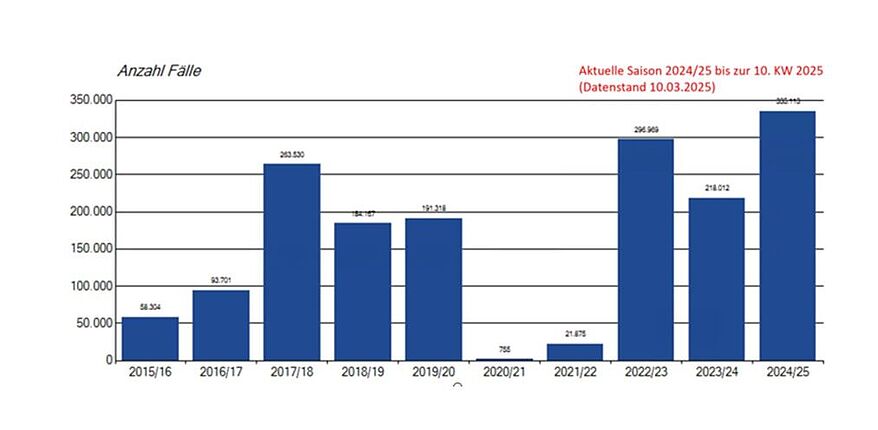The activity of acute respiratory illnesses in the population has been declining since week 5, but remains at a high level. In this year's flu season, data from the Robert Koch Institute (RKI) shows that an unusually high number of children fell ill with severe acute respiratory infections and had to be hospitalised. The age range of those suffering from influenza ranged from 0 to 97 years.
The dominant subtype is influenza A with 2427 reported cases, followed by influenza B with 251 reported cases. There were 45 hospitalisations in 2025. In contrast, only 9 people suffering from influenza were hospitalised in 2024. Since the 7th calendar week of 2025, there has also been a decline in influenza reports.
Overview of influenza reports 2024/2025 by age structure in the Börde district
| Age | Cases 2025 | Cases 2024 |
| 0 to 4 years | 267 | 144 |
| 5 to19 years | 915 | 186 |
| 20 to 60 years | 1095 | 403 |
| Over 60 years | 401 | 156 |
| total | 2678 | 889 |
Status 25.03.2025
Influenza with influenza viruses can be severe and, in the worst case, even fatal. It is a serious illness, especially for risk groups such as older people, people with previous illnesses or pregnant women. The symptoms of true flu, such as high fever, aching limbs and severe fatigue, are much more serious than those of a more harmless flu-like infection. General hygiene precautions such as regular hand washing and keeping your distance from people who are ill protect against infection.
Many cases of illness could be prevented by the flu vaccination. In Germany, the influenza vaccination is particularly recommended for people with an increased risk of severe disease progression. This includes all people aged 60 and over, pregnant women, chronically ill people of all ages as well as healthcare professionals and carers. Younger, healthy people can also be vaccinated. The best time for vaccination is between the beginning of October and mid-December to give the immune system enough time to prepare for the upcoming wave of influenza.
